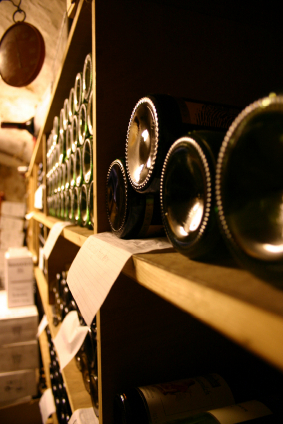How To Store Wine & How Long To Keep It?

The vast majority of wine bought in off licences and supermarkets is drunk within a week of purchase, with a high proportion consumed within 24 hours, so for most wine buyers, storing wine isn’t really an issue!
However, here are a few storage tips:
If you are storing small quantities of wine in the house, or the kitchen, keep the bottles on their sides, so that the corks don’t dry out, and keep away from radiators. This is one of the biggest problems with supermarket wines – many of them won’t stay on the shelf for long, but if the store staff aren’t careful when they refill the shelves, the bottles at the back will simply stay there, hidden by the fresher bottles, and will slowly age, both with dry corks, which increase the likelihood of the wine being spoilt, and also cooking gently under hot supermarket lights. The same goes for slow-selling wines; if you come across any bottles which are standing up and are dusty, avoid!
If you are looking to store a larger quantity of wine, think about a cool, dry place, such as a garage – be careful not to store in a damp outside building ( as I once did), as the damp will cause the labels to mould and I now have several bottles of what I am sure is, or was, very high quality wine, which are now totally unrecognisable, because I forgot they were there and didn’t store them properly, or put neck tags on the bottles. Avoid the garage if it houses the boiler, or if you use it to park the car ( who does these days?!). The best places have an even temperature, are quite dark, and are cool.
Ageing wine
Don’t make the age-old mistake of thinking that all wine, benefits from a few months or years in the wine rack or cellar; my worst experience was being offered a Sancerre, at a dinner party, which my host had lovingly kept in his cellar for 8 years, waiting for a suitable occasion to open – cue my appearance – the wine looked rancid, and tasted of vinegar!
Many white wines, and the majority of rose wines, are best drunk young and fresh, when they are at their most vibrant. This is when they are at their most fruity, with lovely, racy acidity in the wine to provide the lift and ‘zing’. If you leave these wines for more than 6 months or so, they will start to taste flat and their charm will go. The same is true for light sparkling wines, and bone dry sherries, as well as light, fruity reds.
Fuller bodied, often oaked aged white wines, such as white Burgundy and New World Chardonnay can be kept for up to a year, but won’t improve beyond that, with the exception of a few special cases ( see below). The same applies to medium –bodied reds, which will soften out nicely over a few months, and also reds that have already been aged a considerable time at the winery, such as Rioja Reservas.
Non vintage Champagne often benefits from about a year’s ageing, as the flavours intensify, and the style of Champagne becomes creamier and richer. A tip I was once given was to buy a case of Champagne one Christmas, and leave it for 12 months; the following Christmas, drink those bottles, and at the same time buy another case to lay down and store until the next Christmas and so on… it’s worked for me so far, with delicious results.
The wines that really do benefit from ageing are powerful, classic reds, with strong tannins, such as top Bordeaux, Rhone, serious Italian reds, and New World Cabernet Sauvignon and Shiraz – these will ripen and soften and become more complex over the years.
White wines that age beautifully are some of the top white Burgundies, but also very fine German and new World Rieslings, which develop very complex, glorious honeyed flavours, yet retain their fine acidity.